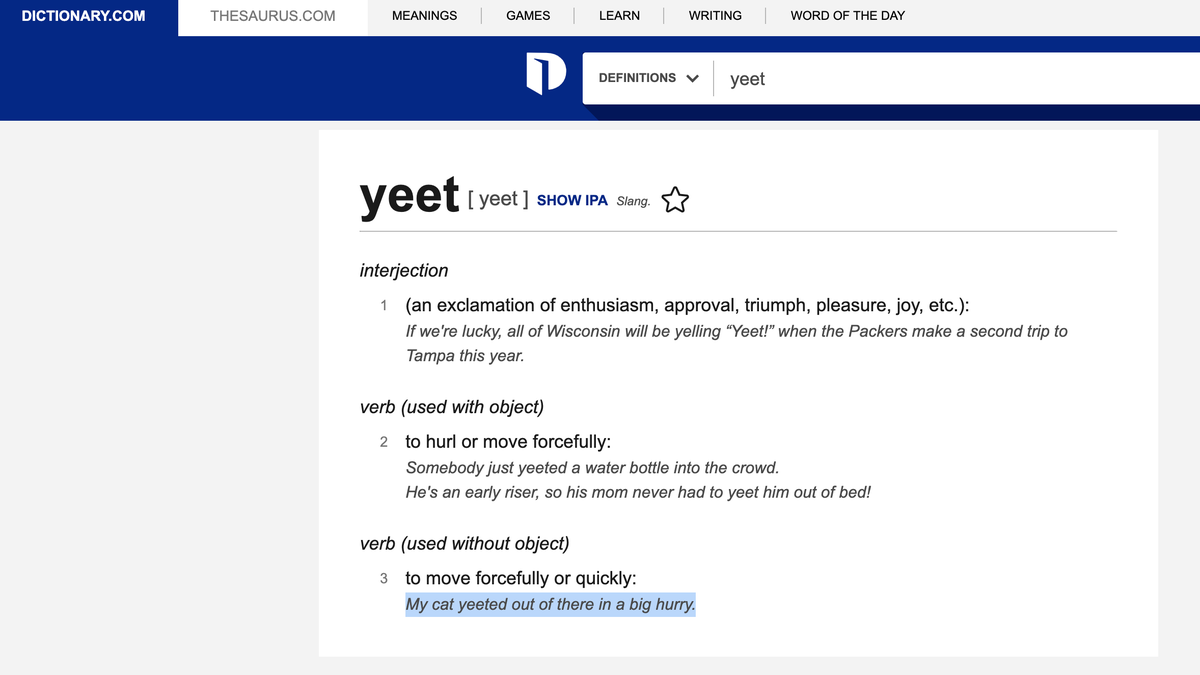The Word “Yeet” Gets Its Own Official Entry on Dictionary.com Leave a comment

While I have not considered myself part of the Youth for quite a few years now, I did not yet feel like I was an Old—until today, when I found out that Dictionary.com had added the word “yeet” to its repertoire. Even Microsoft Word doesn’t know what “yeet” means, as it keeps correcting it to “yet” and drawing an angry red squiggly line under it as I type these words.
This week, Dictionary.com updated its online dictionary with more than 300 new words and definitions, covering topics such as covid-19, online learning, the use of “y’all,” racial justice, slang, and more. The update is a reminder that English is a living language, one that is constantly changing to reflect the world and society we live in.
“The latest update to our dictionary continues to mirror the world around us,” John Kelly, managing editor of Dictionary.com, said in a news release, emphasis his. “Long COVID, minoritize, 5G, content warning, domestic terrorism—it’s a complicated and challenging society we live in, and language changes to help us grapple with it.”
One of those changes is the word yeet. According to Dictionary.com, the slang word was first recorded between 2005 and 2010 and started off as an exclamation of excitement used in Black social media culture that gained popularity because of a dance of the same name. The online dictionary states that yeet can be used as “an exclamation of enthusiasm, triumph, pleasure, joy, etc.”
Still confused? Here’s how Dictionary.com used it in a sentence, which definitely helped this Old stop scratching her head.
“If we’re lucky, all of Wisconsin will be yelling ‘Yeet!’ when the Packers make a second trip to Tampa this year,” the example reads.
G/O Media may get a commission
Nonetheless, like many words, yeet has more than one definition. In addition to being an interjection, it can also be used as a verb in two ways. One meaning is “to hurl or move forcefully” and is used with an object, as in, “Someone just yeeted a water bottle into the crowd.” On the other hand, it can also be used without an object, in which case it means “to move forcefully or quickly.” An example of this use would be, “My cat yeeted out of there in a big hurry.”
Besides new additions of slang and pop culture references—which also included “oof,” “blamestorm,” “zaddy,” and “shit show”—the update also covered tech terms that many of us have become familiar with over more than a year of pandemic hell. These included “asynchronous” and “synchronous,” which Dictionary.com explains are used in the context of remote, hybrid, or blended learning.
Asynchronous refers to a task or action that is occurring or able to be completed independently according to an individual’s own schedule or within a broad time frame. Something that is asynchronous does not need to be coordinated in real-time with another person.
Meanwhile, synchronous refers to the opposite, or something that takes place in real-time, such as when individuals are logged on at the same time for a live lecture or discussion.
Other tech terms in the update ranged from “deprecate,” or older and unsupported versions of software or other computer features and elements, to “deplatforming,” which refers to banning someone from sharing their views in public, especially on social media. A good example of the latter is former president Donald Trump, who is currently banned on Twitter, Facebook, and YouTube.
If you’re an Old like me, don’t feel bad or frustrated if you’re unfamiliar with many of these words or even words that aren’t in the update. Learning is a part of life. As for slang, even Dictionary.com admits that trends in slang and pop culture are “often fast-changing and short-lived.” Only slang terms that present “meaningful evidence” of widespread and sustained use typically make it into the dictionary.
This was, as you can imagine, the case for yeet. Even though I don’t think I’ll ever use the word after I publish this blog, I’ve right clicked in Microsoft Word and added it to my dictionary. Hey, you never know. Besides, I wouldn’t want to look lost while talking to the Youth.

